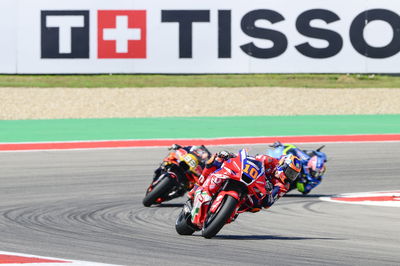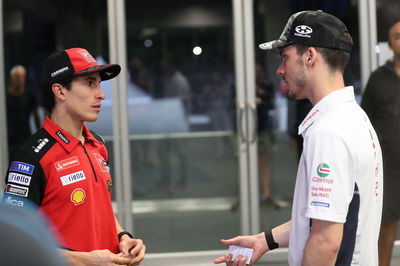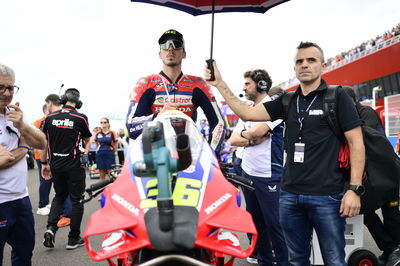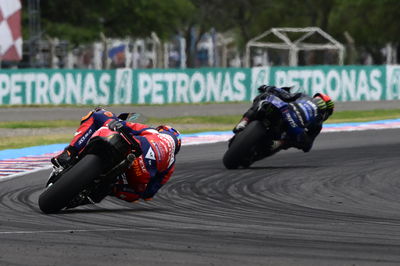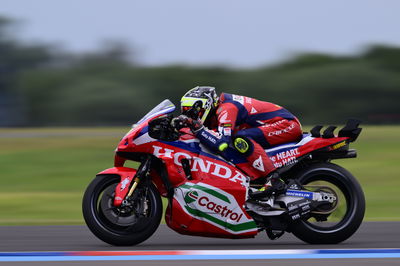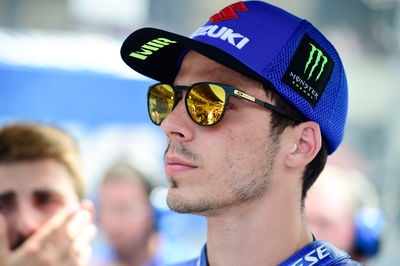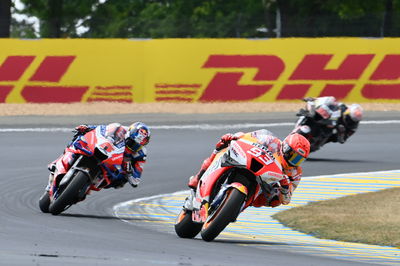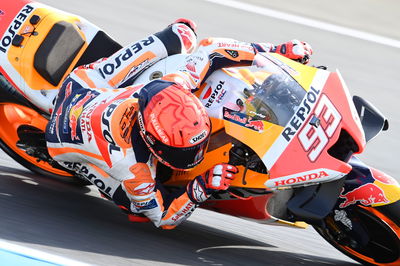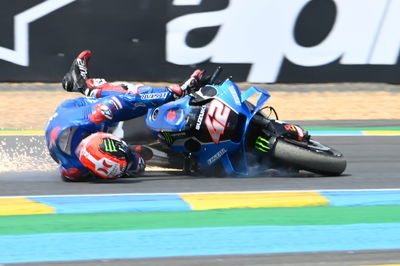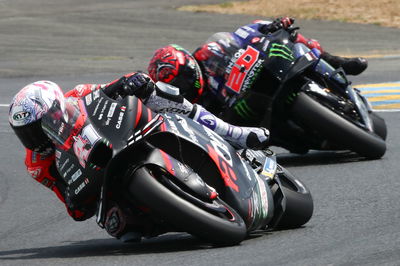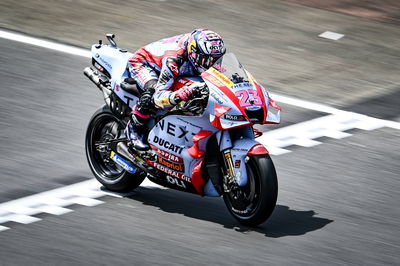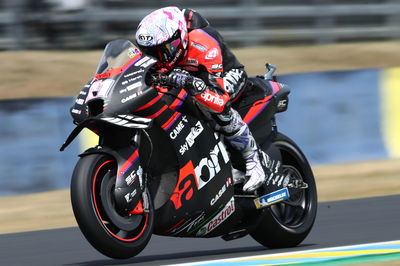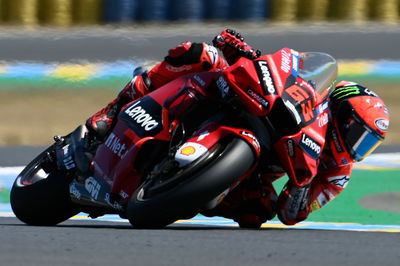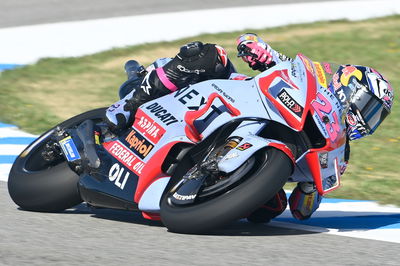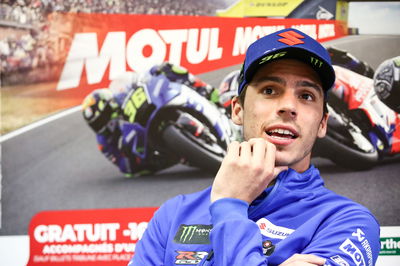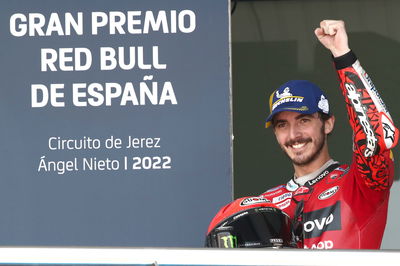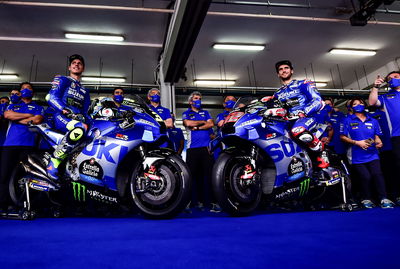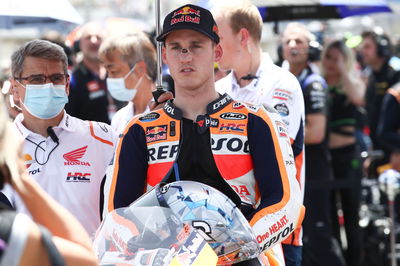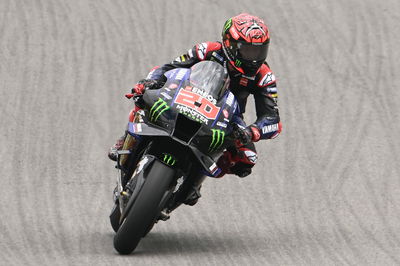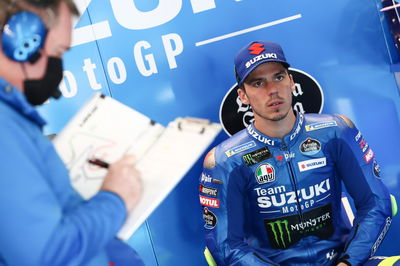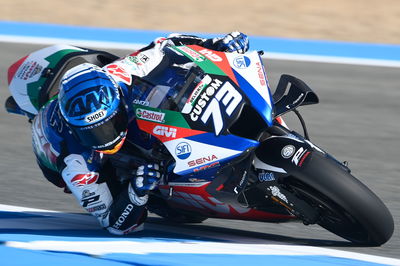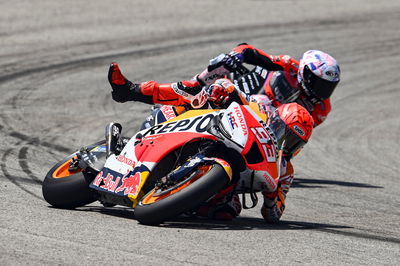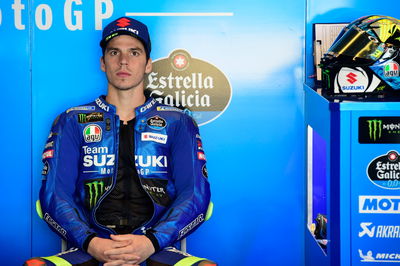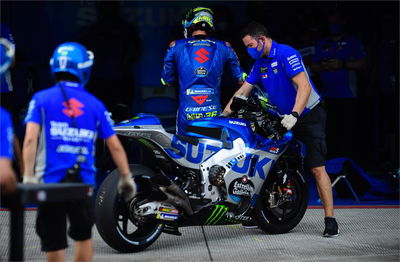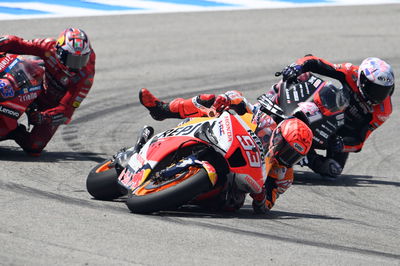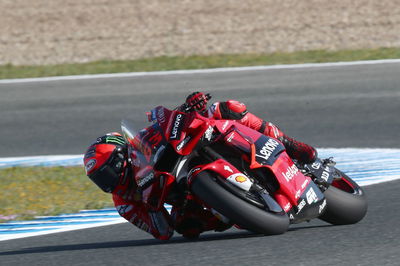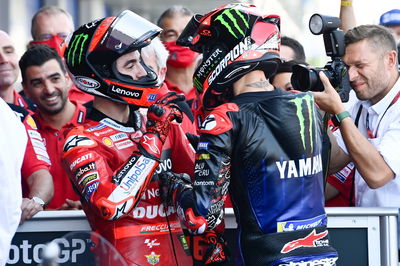Honda HRC
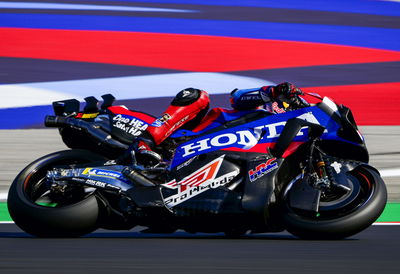
Team Statistics

About Honda HRC
Honda HRC in 2025
Honda's factory team fields an unchanged rider line-up of Joan Mir and Luca Marini in MotoGP this season, but there will be a big visual change with the departure of Repsol, title sponsor since 1995.
Team Information
Honda HRC in 2025
Honda's factory team fields an unchanged rider line-up of Joan Mir and Luca Marini in MotoGP this season, but there will be a big visual change with the departure of Repsol, title sponsor since 1995.
Honda’s MotoGP history
Honda’s long history in motorcycle grand prix began with an entry at the 1959 Isle of Man TT, the company achieving race wins and world championship glory in the smaller classes by the early 1960s.
1966 marked Honda’s debut in the premier 500cc class, with Mike Hailwood finishing title runner-up to Giacomo Agostini’s MV Augusta in both ’66 and ’67.
But Honda withdrew from motorcycle grand prix for 1968, in response to regulation changes limiting cylinder numbers (four for 500cc, two for 250cc, one for 125cc) and transmissions (six-speed). Suzuki and Yamaha, competing only in the smaller classes, followed suit.
After more than a decade away, Honda returned to 500cc in 1979 and planned to pick up where it had left off, using four-stroke technology, by entering the exotic NR500, featuring oval cylinders, against the now dominant two-strokes.
It proved an expensive R&D exercise with 13th place at the 1981 Austrian Grand Prix credited as the bike’s best 500cc result, although a young Freddie Spencer is said to have been on course for fifth at the British Grand Prix before yet another a technical failure.
Honda admitted defeat and built a two-stroke for 1982, the NS500 triple, which (in vast contrast to the NR) won races from its first season and took Spencer to title glory in 1983.
The NSR500 four-cylinder arrived for 1984, with Spencer celebrating a unique 250cc and 500cc title double in 1985 (but wouldn’t win a race again).
Wayne Gardner stepped up as Australia’s first 500cc champion in 1987, before the ‘80s ended with Honda back on top, this time with American Eddie Lawson.
The ‘90s began with the Japanese big three - Honda, Yamaha and Suzuki - still slugging it out for supremacy, Honda enduring a four-year title drought before Mick Doohan flattened the competition with consecutive crowns from 1994-1998.
Repsol arrived in 1995 and has remained title sponsor of the factory Honda team ever since, the orange, red and white becoming one of the most iconic liveries in MotoGP.
Following Doohan’s career ending injuries at Jerez 1999, team-mate and long-time Alex Criville handed Repsol a notable coup as Spain’s first premier-class champion.
Criville took one final Repsol Honda victory at Le Mans in 2000, before a rare winless season for the team in 2001, during the last year of the 500cc class.
While it may have been a forgettable year for the official team, 2001 saw Honda again on top of the world courtesy of new superstar Valentino Rossi, who spent his opening two years in 500cc riding a Nastro Azzurro-backed factory Honda.
The Italian moved into the official Repsol team for the start of the new MotoGP era in 2002, when Honda’s new RC211V won all but one race. Rossi took 11 wins on the way to his second crown, which he defended against the surprise challenge of Sete Gibernau in 2003.
Feeling that his machinery was receiving much of the plaudits, Rossi then shocked the MotoGP world by defecting to Yamaha for 2004.
Alex Barros, a race winner on a satellite Honda at the end of 2002 before claiming Yamaha’s only podium the following season, joined Repsol as his replacement.
The Brazilian rode alongside Nicky Hayden, the popular American Superbike champion who took two podiums at the end of his rookie 2003 campaign.
Although both took podiums in 2004, Repsol went without a race victory as Gibernau (Gresini) and Max Biaggi (Pons) provided Rossi’s main opposition.
Biaggi replaced Barros for 2005, with legendary tuner Erv Kanemoto (instrumental in Spencer’s 1985 Honda double) also hired as technical director.
Kanemoto - whose machines had won 64 grands prix and seven world championships prior to 2005 - and Biaggi first worked together in 1993, taking the 250cc title for Honda in 1997 and then moving to the premier-class the following season, when Biaggi finished runner-up to Doohan.
However, Biaggi peaked with two second places and it was Hayden who took Repsol’s only race victory of the 2005 season, an emotional triumph in front of his home fans on the sport’s return to Laguna Seca.
Rising Spanish star Dani Pedrosa was placed alongside Hayden for 2006, when the American capitalised on early chatter issues for Rossi and Yamaha to build a healthy title lead.
But The Doctor came storming back in the second half and Hayden was wiped out of the lead by shock friendly fire when Pedrosa fell and took him down at the penultimate Estoril round.
That put Rossi back in front for the Valencia finale, but Hayden refused to throw in the towel and, while the Italian faltered in the race, snatched the MotoGP crown.
The switch to 800cc machines for 2007 put Honda on the back foot relative to Ducati and Yamaha. Pedrosa now had the upper hand over Hayden but could only manage two wins per season in 2007 and 2008, after which Hayden moved to Ducati and was replaced by satellite Honda star Andrea Dovizioso.
A distant runner-up to Stoner in 2007, Pedrosa returned to ‘vice-champion’ in 2010, but both Dani and Dovi were then blown away by the Australian’s arrival at Repsol Honda and instant title success in 2011.
By now a certain Marc Marquez was making waves in the Moto2 class and clearly destined for MotoGP with Repsol Honda. Pedrosa’s place was at risk, but when Stoner announced his shock retirement, at the age of 27, Marquez was instead placed alongside his older countryman for 2013.
While Stoner was injured, Pedrosa had delivered his best season in 2012, winning six of the last eight races to keep the pressure on Jorge Lorenzo (Yamaha).
2013 thus looked like Pedrosa’s big chance, but Marquez would be a thorn in his side from the opening round, where he beat the #26 to the final podium place.
Marquez then made history with victory at round two in COTA, but Pedrosa remained in the title fight arguably until a dramatic highside at Aragon, when his traction control sensor was severed during contact with Marquez.
At 20, Marquez became MotoGP’s youngest ever champion and the first rookie champion since Kenny Roberts in 1978, after keeping Lorenzo at bay during the Valencia finale, with Pedrosa confirmed as third overall.
Marquez then romped to the 2014 title with ten wins in a row at the start of the season, before Pedrosa salvaged some pride by breaking his streak at Brno, his only victory of the year.
The 2015 season has gone down as one of the most controversial in MotoGP history, Marquez stumbling to just one win in the first eight rounds, allowing Yamaha riders Valentino Rossi and Jorge Lorenzo to streak ahead.
Marquez went on to win four GPs but was out of the title fight as the paddock arrived at the penultimate Sepang round, where leader Valentino Rossi sensationally accused the #93 of trying to help countryman Lorenzo at the previous Phillip Island round.
The tension between Rossi and Marquez simmered during practice, then exploded in the race, as the pair traded blows. Furious at what he saw as interference in the title chase, Rossi deliberately forced Marquez wide at the penultimate corner, with the Spaniard then falling after contact.
No conclusive proof was found for claims of a deliberate kick by Rossi on the front brake, but he was handed a penalty point, creating a back of the grid start at the Valencia finale.
When Lorenzo then rode to race and title victory ahead of Marquez and Pedrosa, Rossi again accused Marquez of assisting the #99.
Having once enjoyed the rays of Rossi’s extraordinary popularity, the pair forming an early alliance of convenience against mutual adversary Lorenzo, Marquez was now on the receiving end of #46 fan fury.
Not that it bothered him. Marquez was by now the next most popular MotoGP rider with a growing, younger fanbase of his own.
The spat with Rossi would ebb and flow, settling down in the aftermath of Luis Salom’s fatal 2016 Moto2 accident, only to flare up again when they clashed in Argentina 2018 and Rossi later refused the offer of a handshake at Misano.
Argentina aside, where Marquez was fighting back through the field after a problem on the grid and several seconds a lap faster than his rivals, he and Rossi were rarely head-to-head on track and Marquez quickly erased the 2015 title blip with world championships in 2016, 2017, 2018 and 2019.
That was despite requiring major shoulder surgery, due to dislocations, at the start of both 2019 and 2020. But the RC213V was getting ever harder to ride, with Pedrosa’s last win in 2017 and Cal Crutchlow in early 2018. A further warning of the bike’s inherent issues came when Lorenzo failed to even finish in the top ten in 2019, as a ‘dream team’ line-up of the two multiple MotoGP champions proved anything but.
Most scarily, under certain circumstances the Honda would suddenly lose rear grip when accelerating through a corner, causing a massive ‘500’ style highside. The kind of accident that had been all but eradicated by traction control.
It was such an incident that fractured Marquez’s upper right arm at the Covid delayed Jerez 2020 season opener, after a stunning charge through the field following an early off-track moment.
Attempting to return the following weekend, at the second ‘Andalucia’ round, Marquez was passed fit to ride by the medical team but withdrew due to pain from the plated fracture in qualifying.
The plate the broke several days later, while opening a large window, prompting a second round of surgery. A third was then required due to infection and Marquez didn’t return until the opening European round of 2021.
Younger brother and reigning Moto2 champion Alex Marquez was signed to replace Lorenzo at Repsol Honda, but was told he had lost his ride to Pol Espargaro for 2021 even before the (delayed) start of the 2020 season.
With Marc injured and test rider Stefan Bradl brought in as a replacement, Alex impressed with two podiums in his rookie year.
Marc made an emotional return to the top step of the podium at the Sachsenring in 2021, then took what would prove to be his last Repsol Honda wins back-to-back at COTA and Misano.
The #93 then missed the remaining rounds due to an episode of diplopia (double vision) in a training accident. He had previously suffered from the issue during his rookie 2011 Moto2 campaign, after an accident at Sepang. Worryingly, the diplopia then returned for a third time in the aftermath of a massive highside at round two of the 2022 season, in Indonesia.
Marquez returned after skipping one event but, while attention was on the diplopia, the movement in his right arm was still heavily restricted. After failing to finish in the podium during his six 2022 races, Marquez announced at Mugello that he would undergo major surgery in America and admitted his career was at stake.
After missing six rounds, Marquez returned at Aragon, where he made an instant impact after being clipped from behind by title contender Fabio Quartararo on lap one of the race.
Despite another impact from Takaaki Nakagami a few corners later Marquez remained on board and, declaring the surgery a success but lacking strength, he rounded out the season back on the podium with a close second place at Phillip Island.
With a full winter recovery to boost his fitness and test the RC213V, expectations were high for 2023. The Portimao opener began with pole position and a Sprint podium, but a mistake in the race saw Marquez slam into the back of Miguel Oliveira, injuring them both.
Marquez was given a long lap penalty, ‘to be served at the next round in Argentina’. When it became clear Marquez would not be fit to ride in Termas de Rio Hondo, the FIM Stewards tried to change the penalty to Marquez’s next race back, which was overturned by Repsol Honda appeal.
The deficiencies of the Honda were exposed upon his return from the hand injury at Le Mans, Marquez going on to set a new record of 27 falls, including more injuries at the Sachsenring and Assen.
The German MotoGP, traditionally Marquez’s most successful, saw him give the RC213V the middle finger after it tried to through him off before withdrawing from the Sunday race after a heavy hit.
Rumours of a shock split from Honda suddenly emerged at Misano, triggered by a light-hearted ‘things are happening’ football-transfer style social media post by Marquez himself. The seriousness of Marquez’s intentions at that time are unclear, many felt he was simply stirring the pot to try to prompt Honda to react, but he refused to give a straight answer and his demeanour became much more serious after (another) disappointing debut on a future RCV prototype a few days later at the test.
The rumours that Marc would walk out of the final year of his four-year big-money HRC deal and join Gresini Ducati, where brother Alex’s fortunes had been instantly transformed, grew with each passing day. With Marquez and Ducati failing to extinguish the speculation, it became clear talks were indeed progressing and an official split with Honda was announced after the Japanese Grand Prix.
2020 Suzuki world champion Joan Mir replaced Pol Espargaro at Repsol Honda for 2023.
A miserable season saw Mir score in just five grands prix, missing five others through injury as he finished second on the falls list with 23 accidents. In other words, 50 falls for the Repsol duo. Honda's only win of the season (and first since 2022) came with a shock victory by LCR's Alex Rins at COTA.
Despite new technical concessions for 2024, the RC213V scored fewer than half of last year’s points, remained at the bottom of the constructors’ table and rarely broke into the top ten.
Without Marquez, the once mighty Repsol Honda team scored just 35 points and was last in the teams’ standings, before even the satellite LCR squad.
Likewise, Mir (who slotted into the ex-Marc Marquez crew headed by Santi Hernandez) and new team-mate Luca Marini finished 21st and 22nd in the riders’ classification, last of the full-time riders.
By Misano, Repsol, having already downgraded its presence for 2024, officially pulled the plug on its three-decade title sponsorship.
However, Honda was responding away from the race track with more senior Japanese staff re-assigned and much-needed European influence bolstered by 2025 deals with Aprilia technical director Romano Albesiano and race winner Aleix Espargaro, as a test rider.
The RCV also showed signs of progress as the season went on, but it was LCR's Johann Zarco - rather than Mir or Marini - who took the bike's best results.
Latest Photos
